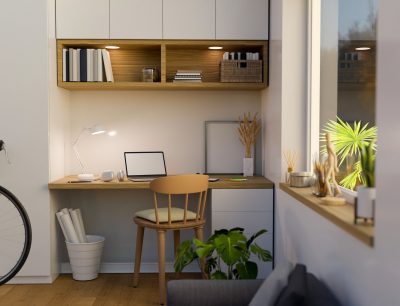Establishing and maintaining an organized home office is the best way to ensure you’ll be able to stay productive no matter how chaotic your work becomes. Here are tips to establish and maintain an efficient work environment.
Establishing Order
Give yourself a clean slate – or, in this case, desk. Dispose of everything nonessential. Ease into the elimination process by getting rid of junk mail, outdated sticky notes, and any other plainly unnecessary items. Next, although the desk may already look better without the old junk, sort through everything else and ask yourself, “Do I absolutely need this?” If you hesitate or don’t know, there’s a good chance it doesn’t belong on your desktop; instead, store it in a nearby drawer or cabinet.
Focus on one area at a time. Each day, choose one drawer, a stack of papers, surface, or cabinet to organize. Otherwise, trying to tackle a whole room at once will lead to unnecessary stress and most likely be less effective.
Anything within arm’s reach should be something you need immediately. An ideal setup might include a lamp, monitor and keyboard, one notebook, two pens, a mug or drinking glass, and a telephone (family photo optional). Keep the personal items to a minimum. A desk covered in non-work-related material is an inevitable distraction.
Give everything a home. It is helpful to label these places if only until returning everything to its own spot becomes instinctive. An item should “live” as close as possible to where it is used, and only frequently used items should occupy the prime real estate of the spaces nearest to where you work.
Don’t try to fit too much into one place. Stashing all of your office supplies in one drawer is not organizing.
Toss dried-out pens and markers and never keep office items that are missing pieces, in poor condition or broken. It’s usually easier, faster, and cheaper to replace such things. Bring to storage any surplus items rather than cramming them into your desk or cabinet.
Rather than filing, consider eliminating completely anything that is out of date and no longer relevant.
Maintaining Order
Condense your notes-to-self. Keep one notebook at your desk at all times where you can jot down thoughts and reminders so they aren’t scattered on various sticky notes and/or pieces of scrap paper. An alternative to such a notebook is an electronic application such as Toodledo, which will go wherever you go, and can be updated on your smartphone or iPad real time as needed.
Dedicate at least 15 minutes at the beginning and/or end of each day to going through the papers on your desk in order to maintain an organized workspace. Work toward establishing a paperless office to the degree that you are able by utilizing products such as NeatConnect along with apps such as Evernote.
Resist the urge to pile. Open the mail immediately and separate it into categories, without necessarily even reading everything. Trash any unwanted mail and keep your bills in an allocated file or container. Keep anything requiring attention in an “action” file.
Keep a constant eye out for anything outdated, useless, or unwanted lying around that can be disposed of to make room for the new.
Keep your floor as neat as (or neater than) your desk. You should be free to roam about your office without worrying about tripping over or stepping on bags, shoes, or coats. Utilize wall space (but not too much!) by adding hooks for coats and umbrellas. A drawer or cabinet can be used to store bags and extra shoes.


 Each Wednesday In Order to Succeed’s blog features at least one tip on organizing, time management, moving and relocation, balancing home and business or well anything else we think you will find helpful. This week’s Tip Day Wednesday is about creating and keeping an organized desk.
Each Wednesday In Order to Succeed’s blog features at least one tip on organizing, time management, moving and relocation, balancing home and business or well anything else we think you will find helpful. This week’s Tip Day Wednesday is about creating and keeping an organized desk. Professional organizers help clients decrease stress, regain control of time and space, improve the functionality and appearance of their office, enhance efficiency, boost productivity and help simplify lives, but you didn’t here it from us. Here are 5 reasons your business should hire a professional organizer, spoken by 5 people who did:
Professional organizers help clients decrease stress, regain control of time and space, improve the functionality and appearance of their office, enhance efficiency, boost productivity and help simplify lives, but you didn’t here it from us. Here are 5 reasons your business should hire a professional organizer, spoken by 5 people who did:




 Or check out holiday decorations in your nearby city or town, by foot. If you didn’t learn during the height of the pandemic that walking is good for stress and your soul, it’s not too late. You can even refer to this activity with a fancy name,
Or check out holiday decorations in your nearby city or town, by foot. If you didn’t learn during the height of the pandemic that walking is good for stress and your soul, it’s not too late. You can even refer to this activity with a fancy name, 


 In most dorms, the bed and desk will take up the bulk of the floor space, but you can bet there will still be plenty of room on the walls. Over-the-door shoe holders are great for storing your favorite footwear, and they can also double for storing other objects.
In most dorms, the bed and desk will take up the bulk of the floor space, but you can bet there will still be plenty of room on the walls. Over-the-door shoe holders are great for storing your favorite footwear, and they can also double for storing other objects. 


 Taking the time to put together organized drawers will save you so much room in the long run. Using acrylic bins is a great way to turn this idea into a reality! You’ll have a specific place for everything, which is the best way to keep your space clean. Make time at least once a week to tidy up your room so that you can ensure the space stays clean.
Taking the time to put together organized drawers will save you so much room in the long run. Using acrylic bins is a great way to turn this idea into a reality! You’ll have a specific place for everything, which is the best way to keep your space clean. Make time at least once a week to tidy up your room so that you can ensure the space stays clean.  Drawers are ideal for dealing with dorm room storage. They keep everything out of your way, but they don’t take up a ton of space. In fact, if you need to, you can even get separate storage cubes and stack them all up. Either way, using several drawers is a fantastic way to store everything.
Drawers are ideal for dealing with dorm room storage. They keep everything out of your way, but they don’t take up a ton of space. In fact, if you need to, you can even get separate storage cubes and stack them all up. Either way, using several drawers is a fantastic way to store everything. 
